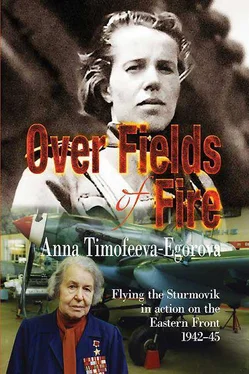“Off you go then…”
It wasn’t too difficult to find General Grechko’s 5th Corps for I knew its location already from the Intelligence Commander of the 1st Corps. I landed my plane almost in the middle of the hamlet, handed the package in and took off straightaway. I remember that General Grechko was very polite. He told me, “Take off your flying suit, you’re wet all over. I’ll feed you and give you tea.”
I said: “I have to head back.”
“No, don’t put on the wet flying suit!”
I was returning to my aerodrome by night: I made circles knowing I had definitely reached it but was afraid to land, lest I crash my plane. It was pitch-dark on the ground. I wished someone would think to light a match at least or have a cigarette! At last I noticed a light and descended for landing. I touched down safely and at that moment my mechanic came up and helped me find the parking lot. Dronov was waiting for me as usual, not leaving the aerodrome. It had been him who, on barely hearing the murmur of my engine, had rushed to the airfield with a blowtorch. It was its light I’d noticed from the air…
Chilled to the bone, dead tired, I entered the command post like a ghost, to report to the squadron commander that the mission had been completed. He listened to me in silence, silently went to the telephone and ordered he be connected to Front HQ. “Permission to go sleep?”
“Granted!” Boulkin casually waved his hand. I was offended. Passing by the canteen I walked towards the house I was billeted in. Despite the late hour my hostess wasn’t asleep. Seeing me in such a state she began to bustle about, wailing “How did you manage to get so fagged out, darling? Have a drink, here’s some warm milk…” She helped me to pull off my wet boots and the flying suit, gave me warm valenki . “May be you’d like to get up on the oven? It’s lit…”
“The oven”, I agreed weakly.
My hostess was the exact copy of my mum. All mothers seem to have something or other in common. Each time I came back to spend the night in her hut she would sit me at the table and start treating me to Ukrainian borsch and the most tasty pickled tomatoes. She used to put all this on the table, sit on the other side and begin to tell me yet again about her three little boys who were fighting somewhere in the North. She would recall how difficult it had been to raise them after her husband’s death, regret that the sons hadn’t managed to get married and present her with grandchildren — the war had started. At the mention of this the hostess would sigh bitterly, wiping with the ends of her apron the tears running down her cheeks and keep plying me with food: “Eat, eat, my girl. Maybe someone’s mum will feel sorry for my little boys and feed them. Maybe even yours!”
After the hot milk I had drunk I got warm on the oven and dozed off. Around midnight someone knocked on the door. Grumbling, the hostess flipped aside the door hook and let in a man in a short army fur coat.
“Where is Egorova?” He asked.
I recognised Listarevich’s voice and responded: “Here I am, Comrade Senior Lieutenant, on the oven.”
“Hard as it may be you’ll have to leave the warmth. You’re called to Front Headquarters. I’m off for a vehicle…”
“I won’t let her go”, my benefactor wailed. “Have you ever heard of a girl tormented so! She’s not had time to dry out, to get warm and you’re getting her up again. Is there no bloke to get up at night? It’s always her…”
I jumped down from the oven, quickly dressed, took my revolver and stuck a map in the leg of my flying boot as the vehicle came up. Senior Lieutenant Listarevich — executive officer of the squadron — deftly opened the door of the pick-up and said apologetically: “Sorry that we haven’t let you have a rest, Annoushka. You’re urgently called to the Front headquarters to report on the cavalry corps you found today.”
Listarevich was a very cheerful and joyful man by nature, liked to joke and laugh but over the last few days he had changed, as if into a different man. The Fascists had been committing atrocities in his native Byelorussia, in the Gomel Province: and his ancestral home was there — his old mother, a teacher and father, a postal worker. We could see Konstantin was worried but he wouldn’t show it and seemed to have become even more energetic and was working with tenfold zeal.
Our squadron, although designated ‘Communications’ nevertheless carried out intelligence duties over the front, searches for units and groupings that Front HQ had no information about. The Chief of HQ often had to stand in for the Squadron Commander. He would have loved to fly missions himself — flying was more to his heart than HQ work — after all he was a former fighter pilot, having flown an I-16. But he couldn’t: it was out of the question…
Our squadron was detached and it had its own kitchen, fuel, everything. We were fed well but you wouldn’t always be on time for dinner. Later they began to issue us bags of sandwiches. Listarevich controlled many services: engineering, the PARM (field aircraft maintenance workshop), technical and provision supplies. But the executive officer kept up with everything. He also found time to talk to us, the pilots, the navigators, to ask what we needed or to say simply, smiling, before a sortie, “Good luck!”
Listarevich and I arrived in Kamensk-Shakhtinskiy, where the Southern Front headquarters was located, after midnight and an orderly walked us into a brightly lit room straightaway. I saw a group of generals around a large desk and stopped in confusion not knowing whom to report to.
“Was it you who flew to search for the cavalry corps?” At last someone asked me.
“Yes, it was me.”
‘Show me on the map where Parkhomenko’s and Grechko’s cavalry are.”
I approached the desk seeing that two commanders had courteously made room for me. But unfortunately I couldn’t recall all the settlements the cavalry were in. Feeling nervous I moved my finger for a long time over the operations map, marked all over by coloured pencils, but nevertheless failed to find the necessary area.
“Permission to show you on my map?” I asked timidly, knowing everything was plotted precisely on it, and pulled out of my flying-boot leg my old large-scale one with routes drafted along its length and breadth but still intelligible to me. Everyone laughed boomingly and amicably and I relaxed — the tension had disappeared.
“Down here…” I pointed immediately.
Questions showered one after another and now I was answering clearly. I didn’t have time to notice who was asking the questions but I was addressing only one General. His kind broad face with beautiful luxuriant moustache attracted me. Smiling, this man pointed with his thumb to another General, behind his back, as much as to say ‘address him, he’s the man in charge here’. But I was dragged as if by a magnet and giving my report, addressed again and again the moustachioed General with the gentle eyes.
When I had showed and told everything they thanked me and let me go. Leaving the room I came across the head of Frontline Communications. He inquired, “How was it?”
“I gave a full report, Comrade General.”
“Well done…”
Korolev hesitated a bit and using the pause I decided to find out who the man was who was smiling at me. “Comrade General, who’s the Commander? Is it the one with the moustache?”
“No, that was General Korniets from the War Council. Why, did you like him?”
“Yes, very much so…” I admitted.
Listarevich and I got back from Kamensk towards morning. But I hadn’t managed to get warm properly and fall asleep when again an order came: “You, Egorova, will have to fly across the front line again to deliver a radio to the cavalry corps. You know the route, I hope you’ll handle it successfully”, Boulkin said.
Читать дальше












